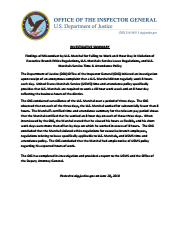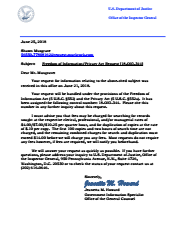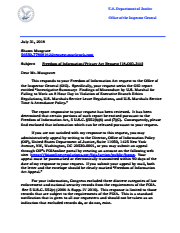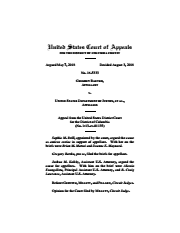DOJ OIG : investigative report for U.S. Marshal -- workday violations
| Tracking # |
18-OIG-344, DOJ-AP-2018-007779 18-OIG-344 |
| Submitted | June 21, 2018 |
| Est. Completion | None |
MuckRock users can file, duplicate, track, and share public records requests like this one. Learn more.
Communications
From: Shawn Musgrave
To Whom It May Concern:
Pursuant to the Freedom of Information Act, I hereby request the following records:
A copy of the investigative report corresponding to the attached investigative summary: "Findings of Misconduct by U.S. Marshal for Failing to Work an 8 Hour Day in Violation of Executive Branch Ethics Regulations, U.S. Marshals Service Leave Regulations, and U.S. Marshals Service Time & Attendance Policy"
As a professional reporter who covers the Justice Department and the US Marshals, I assert that I am appropriately categorized as a media requester for the purpose of fees. In the event that there are fees, I would be grateful if you would inform me of the total charges in advance of fulfilling my request. I would prefer the request filled electronically, by e-mail attachment if available or CD-ROM if not.
Thank you in advance for your anticipated cooperation in this matter.
I look forward to receiving your response to this request within 20 business days, as the statute requires.
Sincerely,
Shawn Musgrave
From: Department of Justice, Office of the Inspector General
Hello:
Attached is the OIG's acknowledgement to your FOIA request.
Thanks.
From: Muckrock Staff
To Whom It May Concern:
I wanted to follow up on the following Freedom of Information Act request, copied below, and originally submitted on June 21, 2018. Please let me know when I can expect to receive a response, or if further clarification is needed. You had assigned it reference number #18-OIG-344.
Thanks for your help, and let me know if further clarification is needed.
From: Department of Justice, Office of the Inspector General
Hello:
Attached is the OIG's response to your FOIA request.
Thanks.
-

~WRD000
From: Shawn Musgrave
To Whom It May Concern:
I respectfully appeal the extensive redaction of documents provided to me in response to this FOIA request, which the DOJ OIG FOIA team assigned tracking number 18-OIG-344.
In June 2018, I requested the following documents under the Freedom of Information Act from the DOJ OIG ("the agency" below):
A copy of the investigative report corresponding to the attached investigative summary: "Findings of Misconduct by U.S. Marshal for Failing to Work an 8 Hour Day in Violation of Executive Branch Ethics Regulations, U.S. Marshals Service Leave Regulations, and U.S. Marshals Service Time & Attendance Policy"
On July 31, 2018, DOJ OIG provided a heavily redacted copy of the report, which I have attached here for your reference. In its response letter (also attached), the DOJ OIG's FOIA office justified extensive redactions as follows: "It has been determined that certain portions of such report be excised pursuant to the Freedom of Information Act, 5 U.S.C. §552(b)(6) and (7)(C)."
Preliminarily, the agency did not indicate which redactions corresponded to which invoked exemption. Without this information, it is difficult to assess (much less rebut) the application of any particular redaction. While both exemptions pertain to personal privacy, distinct standards and case law pertain to each. As such, at minimum I ask that this request be remanded for the agency to annotate redactions for the exemption on which they rely for each.
Second, the agency failed to sufficiently elaborate how the cited exemptions apply in any way to the documents at hand. Exemptions to the FOIA must be applied specifically and narrowly, rather than invoked in a blanket fashion. Here, the agency merely cited the statutory exemption without any explicit or specific justification, even in aggregate. This does not fulfill the agency's obligations under the statute or applicable case law.
Third, the agency failed to sufficiently justify the redaction of entire paragraphs in key sections of the report. See, for example, the final paragraph of page 6 and the first paragraph of page 7 of the report. Where possible, an agency must redact portions of a document. It has an obligation to narrowly redact material, rather than withhold entire paragraphs, particularly where, as here, the agency has failed to justify such redactions with any specificity.
Fourth, the invoked exemptions are inadequate to justify redaction of certain information that simply does not fall under either exemption b(6) for personal information or exemption b(7)C for personal information in law enforcement records. This includes the redaction, for example, of the investigation's case number, which has been redacted on all seven pages of the report. While it is impossible, of course, to know for certain the substance of any redacted information, it is difficult to understand how a case number could comprise personal information, and so be withheld legitimately under the invoked exemptions. Such misapplication of these basic exemptions also makes the rest of the redactions particularly suspect.
Fifth, and perhaps most importantly, the invoked exemptions are inadequate to justify such extensive redaction of the report, including withholding of the U.S. Marshal's name. Even beyond the agency's failure to articulate any clear justification for invoking the personal privacy exemptions, the agency has further failed to meet its burden to prove that the individual, a presidentially appointed and congressionally affirmed U.S. Marshal, has a sufficient privacy interest that outweighs the public's interest in information about substantiated misconduct.
If this U.S. Marshal has any privacy interest at all pertinent to this report, such interest is minimal and outweighed indisputably by the public's interest in disclosure of such information. The public interest in such disclosure is overwhelming, as demonstrated not only by the misconduct finding — information about which the public has an inherent interest as taxpayers and government constituents — but also by the way in which the agency itself dealt with these findings.
The OIG demonstrated the public interest in information regarding its findings by issuing a public press release (attached). Press releases issued by an agency demonstrate the agency's perception that the information contained therein has public value. Any attempt to justify extensive portions of the report — including the identity of the misbehaving official — is directly undercut by the agency's practice in issuing a press release in the first place.
The intense public interest in the official's identity far outweighs any minimal privacy interest the U.S. Marshal holds in this report. As articulated in Perlman v. DOJ (2nd Cir. 2002), pertinent factors in balancing a government employee's privacy interests against the public's interest in disclosure include, among others:
(1) the government employee's rank;
(2) the degree of wrongdoing and strength of evidence against the employee;
(3) whether there are other ways to obtain the information;
(4) whether the information sought sheds light on a government activity; and
(5) whether the information sought is related to job function or is of a personal nature. (312 F.3d 100 at 107).
Each of the above factors further bolster the case for disclosing the investigative report in full, including the name of the investigative subject. As to rank, the requested document pertains to substantiated misconduct by a federally appointed U.S. Marshal. This official was vetted by the White House, the Senate Judiciary Committee, and the full U.S. Senate and is one of the chief U.S. law enforcement officials in a federal judicial district.
As to the degree of wrongdoing and strength of evidence: the redacted report substantiated violations of Federal regulations, DOJ Ethics rules, and USMS policy, including misrepresentations to the OIG itself. The OIG referred its findings to both the USMS Office of Professional Responsibility and the Office of the Deputy Attorney General. The OIG arrived at such determinations via interviews with the U.S. Marshal, physical surveillance, and review of the Marshal's cellphone records. The public has an interest in information about this considerable and substantiated misconduct that far outweighs his minimal privacy interest.
As to whether there are other ways to obtain the information: the Justice Department is the sole agency which holds the requested report, and the OIG is the originator of the investigative report.
As to whether the information sought sheds light on a government activity: this is an inherently governmental activity, namely the misconduct investigation of a high-ranking government official.
Finally, as to whether the information sought is related to job function or is of a personal nature: the substantiated misconduct was inherently job-related, as the OIG substantiated that the U.S. Marshal was not attending work for the duration required under DOJ policy, and the Marshal violated regulations pertaining to work attendance and reporting. This does not pertain in any way to personal matters.
In light of the above, as well as any other reasons you might consider pertinent to my appeal, I ask that you remand this request back to the DOJ OIG FOIA office for good faith processing and release of the requested report in full.
Respectfully,
Shawn Musgrave
From: Shawn Musgrave
To Whom It May Concern:
I hereby supplement my appeal for the extensive redactions through the OIG's response to FOIA 18-OIG-344 in light of the D.C. Circuit Court of Appeals ruling in BARTKO v. UNITED STATES DEPARTMENT OF JUSTICE (attached). The court's ruling regarding the Office of Professional Responsibility's inappropriate application of Exemptions 6 and 7(C) apply equally to the OIG's misuse of these same exemptions in the present FOIA.
As OPR did in the Bartko case, here OIG failed to sufficiently justify its invocation of the cited exemptions, particularly with regard to Exemption 6 and Exemption 7(C).
The D.C. Circuit panel ruled that OPR was generally barred from invoking Exemption 7(C), noting that the agency's focus has shifted over the years to the "internal monitoring end of the spectrum, where Exemption 7(C) has no purchase." The D.C. Circuit found that OPR's attempts to invoke law-enforcement records exemptions were not only "exaggerated," but further did not "rise above the ephemeral." Upon considering OPR's function, the Court found OPR's review process to be "several steps removed" from functions "that could warrant Exemption 7(C) protection," and that such functions are "not nearly enough to trigger Exemption 7(C)."
This applies equally to the Office of the Inspector General, which is also several steps removed from law enforcement functions that might result in criminal or civil sanctions. The report indicates that OIG's findings in the present case were referred to "USMS Office of Professional Responsibility and the Office of the Deputy Attorney General for appropriate action." Under the Bartko analysis, this is not enough to warrant extensive redactions under Exemption 7(C). In light of the Bartko decision, then, I assert that OIG's "attempt to shield its records under Exemption 7(C) merits no deference." OIG cannot justify the extensive redactions it made pursuant to Exemption 7(C), nor has it attempted to do so beyond cursory recitation of the statutory standard.
As to OIG's reliance on Exemption 6, under the Bartko ruling, the "same reasoning dooms [... the] invocation of Exemption 6 [...] as an alternative ground for withholding responsive records," because Exemption 6 "requires an even stronger demonstration of a privacy interest" than Exemption 7(C). "[A]n agency's inability to justify withholding the latter often precludes it from satisfying Exemption 6's heightened requirements," the D.C. Circuit ruled. The OIG cannot justify the extensive redactions it made pursuant to Exemption 6, nor has it attempted to do so beyond cursory recitation of the statutory standard.
Even if the OIG asserts it can meet the requisite threshold to invoke either Exemption 7(C) or Exemption 6 so broadly, it also bears the burden of "making an across-the-board showing that the privacy interest the government asserts categorically outweighs any public interest in disclosure," per the Bartko ruling. It cannot make such a showing here, nor has it attempted to do so. As in Bartko, here the OIG "just sweepingly asserted" that redacted portions of responsive documents would be an unwarranted invasion of the subject attorney's privacy. As the D.C. Circuit found was true for OPR's response to Bartko's FOIA, here the OIG "ignores altogether its obligation to specifically identify the privacy interest at stake, which can vary based on many factors, including frequency, nature, and severity of the allegations."
As OPR did in Bartko, here the OIG made "no apparent effort to weigh any privacy interest against the countervailing public interest in the disclosure of information" concerning findings of misconduct by Justice Department attorneys. An agency "cannot issue a blanket proclamation that a loss of privacy would be 'unwarranted' without considering whether there is a public interest that might well warrant it," the D.C. Circuit ruled.
And as OPR did with Bartko's FOIA request, the OIG here attempted no such balancing analysis in response to the present FOIA. Had it done so, the public interest would certainly outweigh any privacy interest the subject attorney might hold in keeping their name "in the free-and-clear." The D.C. Circuit specifically found in Bartko that "supervisory responsibility comes with an increased public interest." As noted in my initial appeal, the investigative subject herein is a U.S. Marshal who was vetted by the White House, the Senate Judiciary Committee, and the full U.S. Senate and is one of the chief U.S. law enforcement officials in a federal judicial district. The D.C. Circuit Court of Appeals considered this balancing analysis to demolish any attempt to withhold records under either Exemption 7(C) or Exemption 6.
In light of this recent ruling as well as the arguments asserted in my initial appeal, I again request that this FOIA be remanded to the OIG for good faith search and provision of responsive records.
Best,
Shawn Musgrave
From: Department of Justice, Office of the Inspector General
This message is to notify you of a new appeal submission to the FOIAonline application. Appeal information is as follows:
* Appeal Tracking Number: DOJ-AP-2018-007779
* Request Tracking Number: 18-OIG-344
* Requester Name: Shawn Musgrave
* Date Submitted: 08/13/2018
* Appeal Status: Submitted
* Description: OIG
From: Department of Justice, Office of the Inspector General
The FOIA appeal DOJ-AP-2018-007779 has had its Tracking Number changed to DOJ-AP-2018-007779. This is normally due to the appeal being transferred to another agency (for example, EPA to Dept. of Commerce) or to a sub-agency to process it. Additional details for this appeal are as follows:
* Old Tracking Number: DOJ-AP-2018-007779
* New Tracking Number: DOJ-AP-2018-007779
* Requester Name: Shawn Musgrave
* Date Submitted: 08/23/2018
* Long Description: OIG
From: Department of Justice, Office of the Inspector General
see attachment
Files
pages







